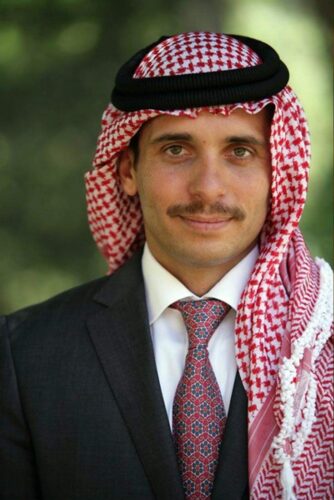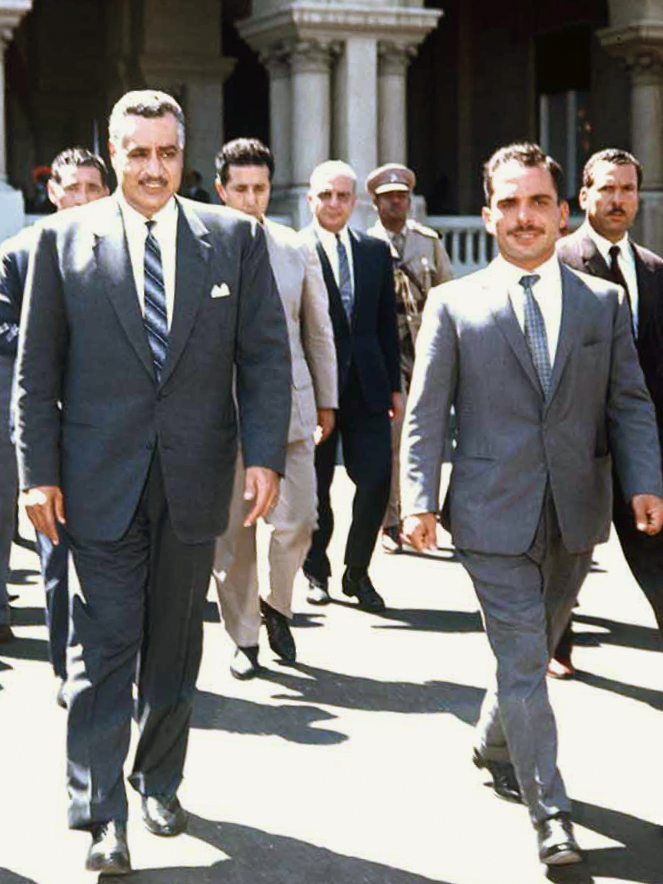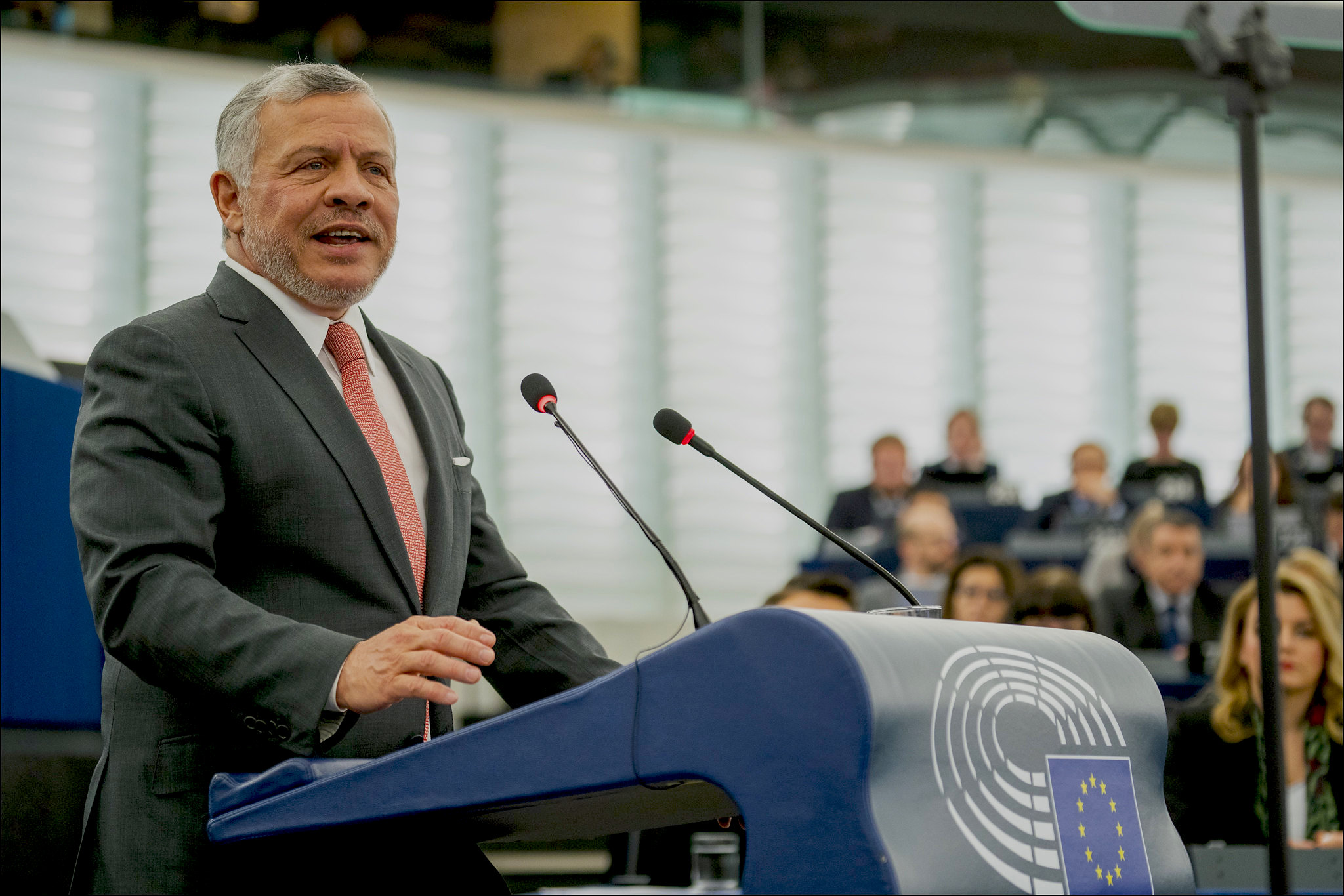As`ad AbuKhalil analyzes the crisis besetting a king whose country has lost strategic significance under his reign.
By As`ad AbuKhalil, Special to Consortium News
Jordan’s King Abdullah II in 2020. (European Parliament, Flickr, CC BY 2.0)
The significance of the political developments in Jordan over the last two weeks can’t be over-estimated, despite it being downplayed by Western media.
The legitimacy of the king’s rule has not been questioned since Black September, 1970, when the Jordanian regime used force to end the PLO’s military presence there. The number of Palestinian casualties remains unknown, but it is in the thousands.
The Jordanian monarchy under King Hussein enjoyed long bouts of political stability after the Jordanian opposition was defanged in 1957, when the king forced the resignation of the popular Sulayman Nabulsi, who was in effect the only popularly elected prime minister in the country’s history.
The king allowed political parties to exist, provided they didn’t question the legitimacy of the regime and allowed members of the powerful intelligence service to join the ranks.
Jordan’s current monarch, King Abdullah II, never matched the skills and political experience of his father, King Hussein, who learned politics at the feet of his grandfather, King Abdullah I.
When Abdullah II assumed the throne in 1999 upon his father’s death, he was as surprised as everyone else in Jordan and ill-prepared for the job. His father never groomed him for the position, as Prince Hasan, uncle of the present king, was crown prince.

Jordan’s Prince Hamzah bin Al Hussein. (Abd Alrahman Wreikat, CC BY 2.0, Wikimedia Commons)
When Hussein was receiving medical treatment in the U.S., then Crown Prince Hasan was already measuring the drapes of the royal palace. Nobody expected the king to alter the line of succession in favor of Abdullah, who never exhibited signs of political interest and was known for his love of cars and video games. The circumstances of the succession in the Hashemite kingdom remains murky. More is known about the succession of Harun Rashid in 809 AD than Hussein’s succession in 1999.
What we know is that Hussein, weeks before his death, ousted Hasan as heir to the throne and instead designated Abdullah as his successor.
Abdullah never grew in the job. He always seemed overwhelmed by the demands and expectations that came with the crown. His Arabic was halting and British-accented — which made him sound like the British officers who were instrumental in the government of Jordan upon its founding.
His rule has been quite different from that of his father in that he could never overcome his public aloofness and inability to relate to average Jordanians. King Hussein’s designation in 1999 of Hamzah as crown prince — his fourth son and half-brother of Abdullah II, instead of allowing Abdullah to choose his own successor — created a persistent mystery.
Hamzah’s mother is the American Elizabeth Halabi, the last wife of King Hussein, while Abdullah’s mother is the British Toni Gardiner. Typically sexist press accounts have either blamed or credited Queen Noor (as Elizabeth Halabi is known) for the change of succession because she wanted to install her own son to the throne.
Jordan’s Queen Noor in 2011. (Skoll World Forum, CC BY 2.0, Wikimedia Commons)
In 2004, King Abdullah then stripped Hamzah of his crown prince title, thereby making his own eldest son (Hussein) the heir apparent. Abdullah waited until 2009 to officially name his son as crown prince.
Hamzah, meanwhile, was educating himself in the art of Jordanian government. He worked on advancing his Arabic, mimicking the speaking style of his father, and building connections with East Jordanian tribes, which form the backbone of the regime. And while never voicing public criticisms of the regime, Hamzah broke the norms in 2018 when he tweeted against corruption.
The rule of Abdullah II has been marred with corruption. There were accusations that his wife’s family also profited from access to power. In the Jordanian monarchic tradition —unlike Gulf royals — no member of the royal family is expected to engage in business. The king and his family were said to have enriched themselves while Jordanians saw their living standards decline.
The kingdom has lost much of its strategic significance since the rise of Abdullah II: he never mastered public policy and frequently changed prime ministers. He was not sure if he should pose as the actual ruler of Jordan or as the figurehead. In times of quiet, he wanted to take credit as the ruler and in time of turmoil, he wanted to be seen as an outsider.
Regardless of his PR campaigns — and he was famous, unlike his father, for hiring Western PR firms to improve his image and that of his wife — Abdullah II is viewed as out of touch. He switches advisers and ministers in an attempt to find the right approach to public policy. Jordanians — with some merit — believe that the U.S. embassy is the actual ruler in Jordan.
Jordan has lost a lot of its political significance in recent years. King Hussein was central in all Arab-Israeli negotiations because he was viewed as the Arab leader who understood and worked closely with Israelis (behind the scenes and also in the open after the 1994 peace treaty).
Hussein represented the Arabs in talks with the Israelis and the Americans; even Egypt’s Gamal Abdel Nasser, after 1967, authorized him to take the pulse of the Israeli government regarding withdrawal from Arab lands.
All this political clout disappeared after Hussein’s death. His son does not seem to have any close relations with any Arab leaders, and he does not represent a specific point of view in Arab politics. The decline of Jordan is largely due to the rise of Gulf regimes and their close relations, nay alliance, with Israel and the U.S.

The late King Hussein flying over the Dome of the Rock in East Jerusalem when the West Bank was under Jordanian control, 1964. (Wikimedia Commons)
Jordan was favored by successive U.S. administrations because Hussein was willing to defy official — and token — Arab consensus against direct talks with Israel. He also allowed U.S. military and intelligence to have freedom of movement in his country while Gulf regimes — before the Iraqi invasion of Kuwait in 1990 — preferred U.S. ships to keep their distance, off on the horizon. (Gulf regimes feared being criticized in Arab politics if they overtly aligned themselves with the U.S.)
The 2003 Iraqi invasion, and the subsequent U.S. war on Iraq, changed the calculus. The historic division between “progressive states” and “reactionary states” that characterized Arab politics for much of the 1960s and 1970s no longer existed. The death of Nasser and the demise of Saddam Hussein’s regime ended all those distinctions.
The Syrian regime fought with the U.S. in the war on Iraq and Libya’s Mu?ammar al-Qadhdh?f? surrendered his entire arsenal and program of WMDs to the U.S. Gulf regimes obtained freedom of action and maneuver and feel they have nothing to fear in Arab politics anymore, especially after the demise of the PLO following the Oslo Accords and the Gulf regimes’ assumption of control over the Arab League.
The Gulf regimes established closer relations with Israel, and even closer military and intelligence relations with the U.S.
As Saudi Arabia, Qatar, UAE, Bahrain and Oman cemented ties with Israel and hosted U.S. troops on their territory, Jordan’s formerly unique political significance declined substantially.

Egyptian President Gamal Abdel Nasser, left, and Jordanian King Hussein at the Arab League Summit in Egypt, Sept. 11, 1964. (Wikimedia Commons)
Abdullah II has no political insights or charismatic leadership to compensate for his country’s declining fortunes. And while the U.S. continued to provide military and financial aid to Jordan, Gulf regimes lost interest in Amman. Whereas they had listened to King Hussein during his reign, no Gulf leader seeks the counsel of King Abdullah II.
Most consequentially, Saudi Crown Prince Muhammad bin Salman (MbS) and Muhammad Bin Zayid (MbZ), crown prince of Abu Dhabi, don’t seem to like Abdullah, and don’t mind supporting a rival within the royal family.
It is no coincidence that all those arrested and accused on April 3 of an alleged “plot” against Abdullah, (Hamzah, Basim Awadallah, a former director of the Jordanian royal court and Hasan bin Zayd, a former top aide to Abdullah) all have close ties to the Saudi regime.
Days after “uncovering of the plot” — in the language of the regime — the Saudi foreign minister paid a rare visit to Jordan. The speculation in some media was that he wanted to arrange for the release and departure of the Saudi regime’s men (Awadallah has been a close advisor of MbS). That speculation seems closer to the truth, despite Saudi government denials to CNN that the purpose of the visit was to support Jordan.
The Jordanian regime seemed flustered in how it handled the crisis: the king appeared weak when Prince Hamzah leaked a video message from his palace saying he was under house arrest. The king’s statement was read on TV, but not by the king himself. Perhaps Abdullah worried that his Arabic would appear inferior to that of Prince Hamzah, who affects the tone and accent of their father, King Hussein.
The intelligence and army apparatus seemed unable to tame the rebellious Hamzah. But it is highly unlikely that the prince would dare challenge the very legitimacy of his half-brother, and even of the kingdom itself, without relying on some sort of external support (chiefly Saudi and Emirati).
Hamzah appeared on TV with the king on Sunday and NBC reported that he pledged allegiance to Abduallah on Monday. But this crisis won’t go away soon. The Israeli-Saudi-UAE alliance dislike the current king and would love to install a more convenient puppet — not that King Abdullah II stands up to Saudi Arabia or UAE.
Israel wishes to have a king who would emulate the fast pace of normalization pursued by MbZ — who is undermining Palestinian Authority and Jordanian plans in Palestine through the sinister Muhammad Dahlan, the former Fath leader in Gaza.
MbS, for his part, may want to wrestle the religio-political guardianship of the Aqsa Mosque from Abdullah. That would add to his legitimacy as he struggles to ascend to the throne.
Furthermore, MbZ, like Israel, has been very unhappy with Jordanian opposition to the “deal of the century” and to the so-called “Abraham accords.” Jordan’s opposition to normalization with Israel has made the UAE regime, which has embraced it, seem out of step with Arab consensus — even at the official level.
The Biden administration exhibited its full support for the king — and to every pro-U.S. despot in the region. Now is not the time for another MbS adventure, as far as the current administration is concerned. MbS and MbZ may be preparing for another round of trouble-making in Jordan, and Abdullah has to promise his people more than token sets of reforms.
As`ad AbuKhalil is a Lebanese-American professor of political science at California State University, Stanislaus. He is the author of the “Historical Dictionary of Lebanon” (1998), “Bin Laden, Islam and America’s New War on Terrorism (2002), and “The Battle for Saudi Arabia” (2004). He tweets as @asadabukhalil





From a web newspaper called Arab Weekly:
@ Ted Belman:
Not surpersed. I have a jaundiced view of that gentleman. He obvously HAS to be au fair with al their plans, goals and potential disruption of the area. He must gave retained his friendly connections with them, and therefore is not impatiol. To ignore this in his -so trhthful and -well known writing, with an impecable repuation… who would know if not he >..??, I’m sire he never reported anything of a hamful naiturer to the PA,
(is it -meh, or -mah??? Not important…!.)
Did you know that Khaled was the editor of the Dawn, the PLO news magazine, for a number of years around 1990 and he took orders from Arafat.
@ peloni1986:
The audacious disregard for the Law by the Israeli judiciary knows no bounds.
I’ve had my own experiences with Abu Tomah….I believe I posted it here. I’ll post it again.
My experiece showed him to be a liar, prevaricator and possibly making up stories to “report” as “news”. In one report , his main subject was the devaluing of East Jerusalem property. spoke of a complaining Arab houseowner in East Jerusalem who supposedly told Tomah that property there was worth nothing, that he had a lovely house he was trying to sell for $52,000, with no takers.
I immediately emailed abu Tomah ans told him that I would buy the house, as I wanted to return to Israel, to please let me have the contact of the, which would tfo both of us a favour (in so many words). He responsed, a long rambling evasive missive which told me nothing. I emailed again asking plainly for the info, for which he’d written a report. His respnsive was quite abusive and when I replied, he dedn’t respond.
So that was that. Nice guy -with all those awards which specified his truthfulness , objectivity ,……and Uncle Tom Cobbeley and ALL…., Well earned of course, not a smell of Political Correctness about them…Naah…!!
This statement coming from a jurist during court proceding is outrageous! Did the judge really make this comment?
Such a statement made in court exposes the level of what can only be described as a puzzling logic guiding the only non democratic element in the gov’t. The use of the judiciary to oversee disputes and rule for or against a given party is a fundamental element in modern form of republican democracies across the world and it was the initial intent that these officials should judge with complete impartiality – hence the adoption of the familiar image of ancient goddess Jusicia left blindfolded while weighing the scales of justice to prevent any influence or intent. But with a routine display of these modern jurists not just holding partisan views and acting on them, but, rather, now heralding such bias to the world for all to see, actually moves the balance of the scales of justice by promoting their bias as the new cipher thru which all further judgements can be reckoned. The concept of justice needs to be dependent solely upon the evidence and testimonials presented in court so that a judgement will arise which is soundly based upon only these evidences and testimonials and not to any relationships or preconceived notions that might exist by the ruling official – the judge. It is with a sense of blindness by this judge to all facts related to either party or the dispute that should form the very foundation of any sense of impartial ruling by the judge. This impartiality seems so basic and should be recognized as being so undeniably requisite upon the judge that one, of course, feels foolish, almost child-like, for even having to speak of it. It is unfortunate enough that, as with all professional operators such as doctors, lawyers, accountants and such(translators too, I guess), the equity of our fates and fortunes are influenced as much against the level of competence of our advocates, if not more, than the merits of our given predicament. Beyond this, though, to have a ruling be handed down by a rogue dressed in judges cloth and have it stated that one party could never be judged afoul is beyond belief. Not only would this color the judgement, it sets the basis for all further rulings by the judiciary such that the blindfold placed upon Justicia’s brow would be replaced with rose-colored glassware. This reckless abandonment of even the recognition of such proper etiquette renders judicial procedures dependent upon the pulse of the the ruling elites rather than a purely meritorious judgement. The common-placed betrayal of the democratic values seen daily in the Western world by the very men who sit as gatekeepers to justice and, consequently western democratic ideals, reveals them to appear less as the erudite sagely class of moralists that were intended and more as a murder of crows ripping apart the torn remnant of the ethics of impartiality that they were empowered to defend.
@ Ted Belman: In reproducing the article, I was certainly not trying to support the allegations of your adversaries or to endorse the settlement that was reached. I just wanted to inform you and Israpundit readers that your ( and our) adversaries have been able to expoit this as a propaganda victory, and to read your response and explanation. You have now completely answered my questions.
As may be seen from my further comment that you have let stand, I certainly did not approve of the settlement or how the judge handled the case. His ruling that Mr. Abu Khaled’s credibility could not even be questioned was not a fair or proper ruling. No judge should treat the credibility of any person whatsoever before his court as beyond question. I am not saying that Mr. Abu Khaled is guilty of any wrongdoing. I don’t want him to sue me too. But I certainly do not believe that you were guilty of any wrongdoing either. I do think Israel’s court system is deeply flawed.
I wish that this dispute between pro-Israel people had never happened.
>?@ Adam Dalgliesh:
I removed you comment where you copy the article attacking me from Elder of Zion because it is misleading in the extreme. The article claims that I smeared Khaled even though I had no evidence. The truth of the matter is that I had a lot of evidence including that of Mudar’s and that of Khaled’s own brother who was on board to testify at the trial.
From day one of the trial, I took the position that I was ready to settle providing I did not have to pay damages or costs. On the morning of the hearing, our lawyers started discussing settlement. I was at a severe disadvantage because everything said in the courtroom was in Hebrew and my interpreter could not keep up especially when I asked her to repeat what she said. She talked too softly and I am hard of hearing.
My counsel came back from settlement discussions and told me that Khaled had agreed to settle without damages or costs in his favour. The Court prepared a protoc?l settling out the terms of settlement which included one sentence which had never been discussed before. Namely I was required to admit that I had no evidence. I was also told that my lawyer admitted to this. I was prepared to say that I did not have sufficient evidence but it was too late to renegotiate the terms. So I was faced with the choice. I could whitewash Khaled by saying I had no evidence and thus end the matter at no cost to me or I could reject the settlement. I chose the former, not once thinking that my false admission would open me up to the attack set out in this article.
I didn’t read the article carefully as it was too upsetting. How could any judge make a pronouncement that it was “inconceivable that his credibility should be questioned or harmed.” about him or anybody.
@ Adam Dalgiesh:
Mudar is right in this case. Jordan is the world headquarters of the Muslim Brotherhood and the MB is very influential in Jordan. As you know, the MB is banned from the Gulf States and Egypt. Also the MB is embraced by Turkey and Qatar and is an ally of Iran’s even though it is Sunni.
@ Adam Dalgliesh: Notice that Mudar Zahran was not allowed to testify,” even by video” in Ted’s defense. Real justice when the primary defensewitness is not allowed to testify. Notice the judge ruling that it was
The idea that a “renowned and respected” individual is incapable of lying is a fallacy, although it is one that many judges make. Some years back the “renowned and respected” novelist Geoffrey Archer–who was and still is an English lord–won a libel suit because his wife testified on his behalf, and the judge decided that a woman of her excellent character and great beauty could not have lied when she testified on her husband’s behalf. She-didn’t. But her husband, Lord Archer, lied to her, and she testfied for him out of loyalty. Later, Archer was convicted of perjury for his false testimony in his libel suit.
Please don’t get me wrong. I am not accusing Mr. Abu Toameh of being a spy or of any wrongdoing whatsoever. I am only commenting on the injustice and bias of Israel’s judges. The judicial system in Israel is in drastic need of reform.
This article confirms everything that Mudar Zahran has said about Abdullah being a bad and unpopular king. One area where these two experts disagree is where Prince Hamzah’s loyalties lie. Mudar says he is aligned with Iran, while AbuKhalil says he is aligned with Saudi Arabia and the Gulf states. On this point I suspect that AbuKhalil is right